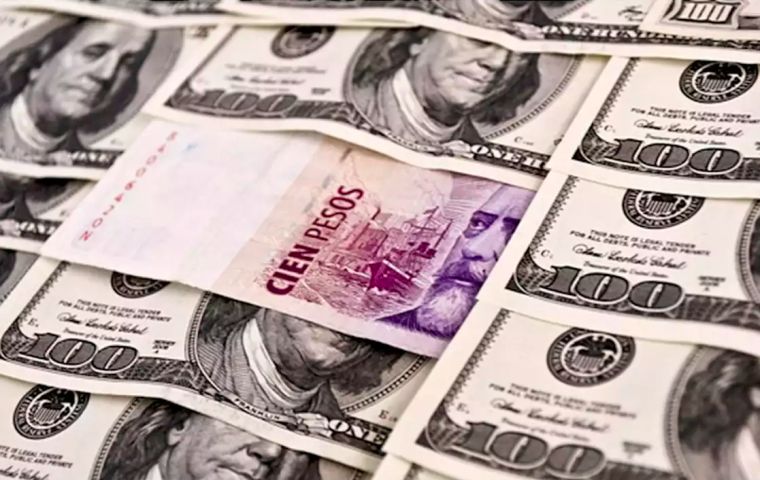MercoPress. South Atlantic News Agency
Modest optimism Argentina and bondholders can strike a deal by 22 May
 Argentina’s over-the-counter bonds rose 3.1% on average on Tuesday. They closed up 2.3% a day before when the government announced the extension
Argentina’s over-the-counter bonds rose 3.1% on average on Tuesday. They closed up 2.3% a day before when the government announced the extension  Georgieva, managing director of the IMF, said the fund was “very keen” to support Argentina as it deals with both the coronavirus crisis and its unsustainable debt level
Georgieva, managing director of the IMF, said the fund was “very keen” to support Argentina as it deals with both the coronavirus crisis and its unsustainable debt level Argentine bonds jumped on Tuesday as the country’s government and creditors sought to strike a deal to restructure US$ 65 billion in foreign debt by May 22 after an initial deadline passed last week without a pact.
The extension, and Argentina’s willingness to hear counter-proposals to its rejected initial offer, has raised slim hopes that an agreement could be reached in 10 days, despite the two sides remaining far apart on the terms of the deal.
Argentina’s over-the-counter bonds rose 3.1% on average on Tuesday. They closed up 2.3% a day before when the government announced the extension after failing to attract sufficient support for a comprehensive deal.
“While the period of negotiation was extended to May 22, the government will need to make substantial improvements to the original offer to reach the majority it needs,” Buenos Aires-based brokerage Mills Capital Markets said in a note.
“There is a gap between what the government is offering and what its creditors want,” the brokerage added.
Argentina’s initial proposal involved a three-year payment halt, a steep cut to coupons, a smaller reduction in capital, and maturities being pushed back to 2030 and beyond.
The new deadline means the offer will close the same day Argentina is due to pay US$ 500 million in interest payments on bonds involved in the restructuring. Failure to pay or reach a deal in time would see the country enter default.
Kristalina Georgieva, managing director of the International Monetary Fund, said on Monday the fund was “very keen” to support Argentina as it deals with both the coronavirus crisis and its unsustainable debt level.
“What I see in Argentina is actually a government that wants to do the right thing for its own people, and for its role in the region, (and) in the world economy,” Georgieva said.
Argentina owes the IMF around US$ 44 billion after striking a record deal with the lender in 2018. The government of center-left Peronist Alberto Fernandez is in talks over a new program with the IMF to help push back payments.
Argentina, a major grains producer is revamping a crippling debt pile amid recession, high inflation, and increasingly expensive borrowing costs, as concerns over a potential ninth sovereign default have rattled investors and hit bond prices.
Major province Buenos Aires is also renegotiating around US$ 7 billion of its own foreign debt. The province, which faces bond payment deadlines this week, has also pushed back a deadline for talks with creditors until late May.




Top Comments
Disclaimer & comment rules-

Read all commentsThe IMF's support for Argentina in the current situation would have been unimaginable in the past, and it's a welcome reverse.
May 14th, 2020 - 03:18 pm 0Indeed, the four-year term of Mauricio Macri as president has put the county in a tough situation that is well understood both domestically and internationally.
Argentina was already in a default position as Macri left office last December, and the ensuing COVID-19 pandemic has only made the situation worse and shared by most countries around the world in terms of GDP drop.
As the world enters a whole new and dire situation, private bondholders have the possibility of reaching a reasonable deal that will give Argentina an opportunity to recover and keep paying, with creditors being able to keep their books in the black and payments flowing to their coffers.
A reasonable deal is way better than no deal at all.
Commenting for this story is now closed.
If you have a Facebook account, become a fan and comment on our Facebook Page!